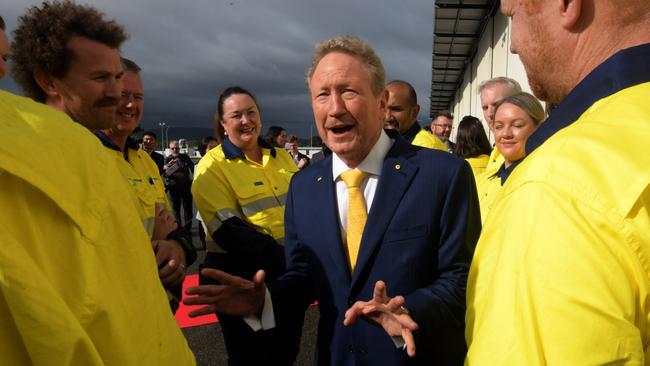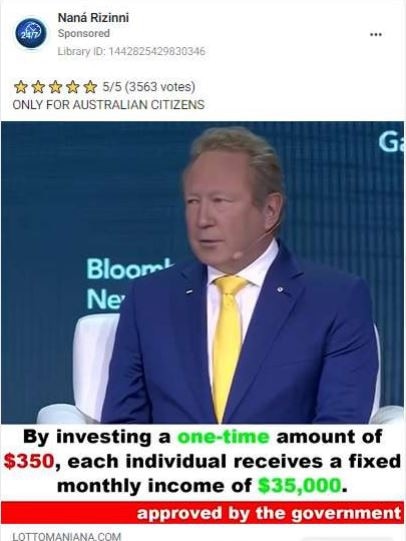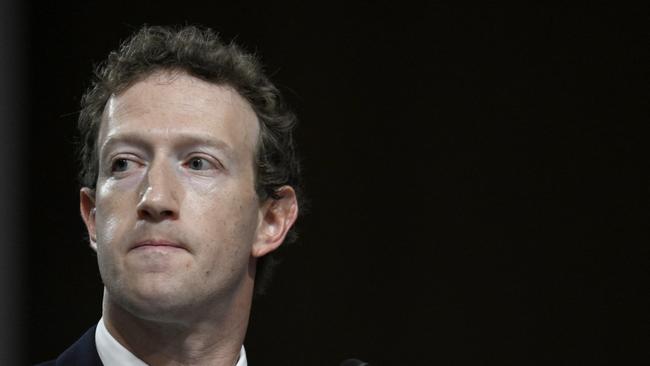US judge dismisses Meta appeal against Andrew Forrest’s scam court case
The mining billionaire says he has secured another crucial victory against the US social media giant, with his legal action now progressing to discovery.

A Californian judge has dismissed Meta’s appeal on Andrew Forrest’s ‘crucial victory’ against the social media behemoth and his crusade against scammers that plague Facebook and its other platforms.
Meta – which hired the same high profile lawyer as Democrat presidential hopeful Kamala Harris – failed to secure permission from judge Casey Pitts on Friday morning to overturn a June ruling that said Dr Forrest’s fight against the company had merit.
Dr Forrest is suing the Mark Zuckerberg-led company after it failed to take down scam advertisements featuring his likeness that have fleeced some Australians of their life savings.
Meta sought to use a 30-year-old American law that gives social media companies immunity from the content that users post on their platforms. But Dr Forrest argued that advertising was different to users’ posts, given Meta accepts money from advertisers and has a screening process before publishing.
Meta argued that third party players were still creating the content and under the present law – because the company is not involved in the creation or promotion of the final content – it was not responsible.

Dr Forrest’s lawyer, Joshua Matz, said the dismissal of Meta’s appeal efforts was an “important legal win”.
Mr Matz said there were enough allegations of wrongdoing for the case to now proceed to discovery and it would not make sense to send the case for an immediate appeal.
“Meta was arguing that they have a valid statutory defence to our claims and that they shouldn’t have to go to trial or turn over any discovery in the case until the issue is resolved by an appellate court,” he said.
“This is an important case, and it has the potential to make clear that Meta cannot continue to co-create and otherwise involve itself in the development of scam ads. We are therefore pleased that Judge Pitts gave the issues careful consideration and reached the correct result.”
Mr Matz said the rise of artificial intelligence had made scam advertisements become more realistic and believable, robbing more people of their lifesavings.

Dr Forrest said that more than 1000 ads appeared on Facebook in Australia between April and November last year. He said the belief that many people have in his “integrity has encouraged them to invest in the fake schemes, leading the victims to lose millions of dollars”.
The story so far
Dr Forrest first raised the fraudulent advertisements with Meta in 2014. Nothing happened. He personally wrote to Meta founder and chief executive Mark Zuckerberg, but didn’t hear back.
As a result of the lack of action, one Australian woman fell victim to a scam featuring Mr Forrest’s likeness and lost $670,000.
Another man clicked on a link in a fraudulent Facebook add and was swindled out of $77,254, and a 72-year-old Western Australian known as “FZ” lost $250,000 – which he has not been able to recover.
Dr Forrest has also written to Meta’s Australian boss, William Easton, who replied: “I appreciate this is very frustrating for you – it’s an extremely challenging, industry-wide problem which we are working to address.”
Another hearing is schedule October 31 to resolve any disputes Meta and Dr Forrest have regarding the scope of Facebook’s discovery and other case management issues.
Meta and its social media platforms, including Facebook, Instagram and WhatsApp, have attracted tens of thousands more scammers than rivals such as X and Reddit, according to data from Texas-based Zimperium. It detected 99,690 scam hits on Meta’s platforms between October and March.
Facebook accounted for the lion’s share, with 53,275, followed by WhatsApp with 30,612 and Instagram 15,803, according to data obtained by The Australian.






To join the conversation, please log in. Don't have an account? Register
Join the conversation, you are commenting as Logout